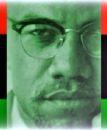Malcolm X made a bigger impact on black politics and culture dead than alive. The Watts Rebellion occurred and the Black Power Movement emerged just months after his death, and his ideas about community control, African liberation, and self-pride became widespread and influential. His autobiography, written with Alex Haley, became a movement standard. Malcolm’s life story proved to the Black Panther Party, founded in 1966, that ex-criminals and hustlers could be turned into revolutionaries. And arguments in favor of armed self-defense—certainly not a new idea in African American communities—were renewed by Malcolm’s narrative and the publication of his speeches. Even after the death of Martin Luther King Jr., when the civil rights leader was celebrated as an American hero by many blacks and whites, Malcolm’s image loomed much larger in inner-city communities, especially among young males.Despite the collapse or destruction of Black Nationalist organizations during the mid-1970s, Malcolm X continued to live through the folklore of submerged black urban youth cultures, making a huge comeback thanks to rap music, black-oriented bookstores, and Afrocentric street vendors. The 1980s were a ripe time for a hero like Malcolm X, as racism on college campuses increased, inner cities deteriorated, police brutality cases seemed to rise again, and young black men came to be seen as an "endangered species." Malcolm’s uncompromising statements about racism, self-hatred, community empowerment, and his background as a "ghetto youth," made him the undisputed icon of the young.
HOT
Add to My Profile | More VideosI Beleive
Add to My Profile | More VideosBLACK AUGUST (the movie) TRAILER
Add to My Profile | More Videos
